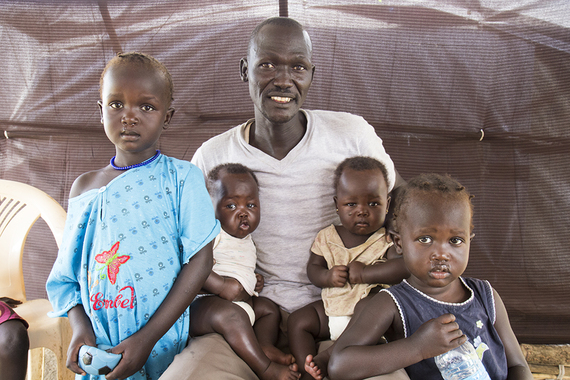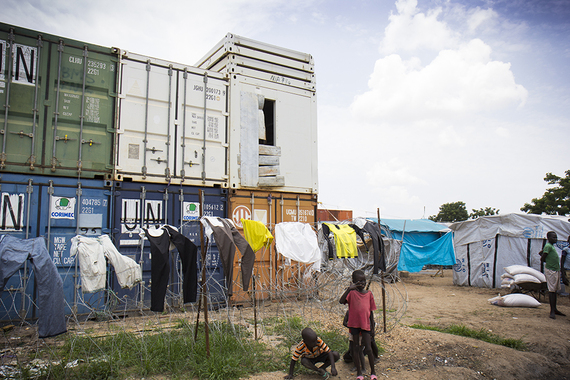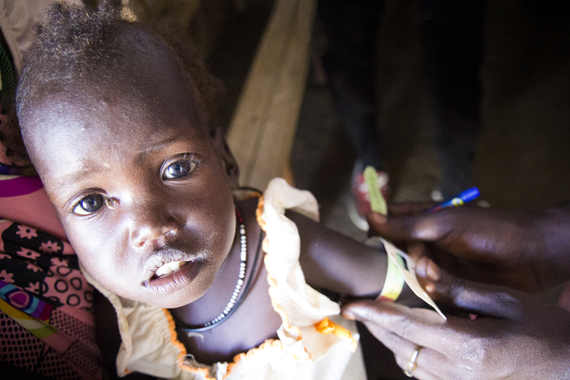A year ago, James Gatluak, 38, was working with farmers across all nine counties in Unity State to increase food production. Today, he is stuck in a displacement camp in Juba, his state overrun by violence and its people sliding closer to famine.
Before civil war broke out in South Sudan, Gatluak was working as the Director of Agriculture for the government of Unity State, helping farmers to increase their yields in hopes that Unity State would one day be food secure. Before that, he was Unity's Director General of Environment and Natural Resources, and in that capacity was interviewed by the Washington Post in 2011.
Today he lives with his family in a makeshift shelter on dusty red ground. When humanitarian crises hit countries around the world, governments are often strained at the seams, which is one reason organizations like Concern Worldwide step in to help. In this case, Gatluak's story makes those government stresses unusually clear.
For the moment, his goal of food security for Unity is shattered, as the state and its capital, Bentiu, have been a flashpoint in the country's ten-month-long civil war, largely because of the oil fields that come with it. The conflict has forced people to scatter, with some 47,000 seeking safety at the U.N. base in Bentiu, while the fields that Gatluak and the farmers had high hopes for remain unplanted.
"Food security and livelihoods can't take place with insecurity," Gatluak says. "No one will cultivate so long as there is fighting."
Trapped in Juba
In December, Gatluak left his pregnant wife, Elizabeth, and their two children at their home in Bentiu to attend a workshop at the Ministry of Agriculture in Juba. He was there when, on the evening of December 15, gunfire erupted in the capital.
A political rivalry between President Salva Kiir and his former vice president Riek Machar boiled over, with soldiers splintering from the national army and forming an opposition group under Machar. Fighting descended upon Juba and quickly spread across the country, not even three years after South Sudan became an independent nation following decades of war.
"There was lots of confusion in the beginning," says Gatluak.
Like thousands of others, he fled to a U.N. base on the outskirts of Juba for safety. It was not long before Bentiu was consumed by violence. Gatluak told his wife to head south to the town of Leer, but the fighting soon spread there.
This pattern continued until March, when they were reunited in the displacement camp known as U.N. House in Juba. One month later, his wife delivered twin girls. The family now lives under tarp and timber beside thousands of other displaced families, miles from home, the life that they once knew a distant memory.
A New Normal
More than 30,000 people live on the U.N. bases in Juba, their lives oddly on hold and moving forward at the same time. Many say so long as there is war, they feel safer on the U.N. base and are getting by with the support of organizations like Concern Worldwide. Gatluak says his home and land are gone and, despite his impressive resume, doesn't know if he will have a job to return to when the war ends. "It's a different environment now," he says, cradling his two twins girls. "I am the caretaker of the children."
Crisis in Unity State
The international community warns that if the conflict does not end, famine will likely grip South Sudan at the end of the year or beginning of 2015. The U.N. estimates that four million people will be at risk of starvation and that 50,000 children could die. The northern states of Upper Nile, Jonglei, and Unity, where most of the heaviest fighting has taken place, will likely be the epicenter of the crisis.
The ongoing instability makes it extremely difficult, if not impossible, for humanitarian organizations like Concern Worldwide to help people living outside of the U.N. bases in remote areas deep in the bush. This, coupled with the fact that there will be no crops to harvest by the time the rains end in November, paints a very grim picture for a country that celebrated its third birthday just this past July.
"The priorities for people now are to survive," Gatluak explains. "They are not focused on their crops...There is starvation. Everything now is emergency."
If the War Ends
With a fourth ceasefire broken within hours of signing, peace seems tenuous in South Sudan. If peace does come, Gatluak wants to resume his work with the farmers of Unity State.
He believes that, with the help of the government and organizations like Concern, they can go back to creating a Unity State that produces enough food to feed itself. "There are a lot of resources in Unity," he explains, "lots of oil, lots of agriculture. It's a rich state...At the end of the conflict, I hope that we will unite together."
Concern Worldwide is an international non-governmental organization dedicated to reducing extreme poverty through emergency response, recovery and development programs. For information, please visit concernusa.org or follow us on Twitter (@Concern).



